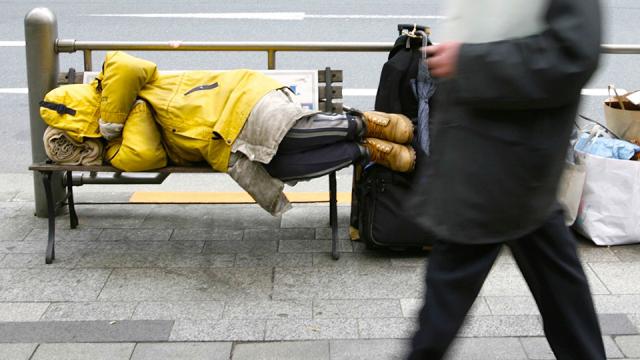
A new study has found that ordinances effectively making homelessness a crime, such as sitting on the sidewalk, are increasing across the country.
The National Law Center on Homelessness & Poverty has tracked laws in 187 cities since 2009 to study the spread of measures that criminalize homelessness. The latest report, released last Wednesday, found an uptick in nearly every type of different criminalization ordinance.
These anti-homeless laws can take a number of different forms. Fort Lauderdale recently moved to make it illegal for homeless people to have possessions with them, while Honolulu is considering a law to criminalize sitting or lying down on sidewalks.
Last year, Tampa passed a new law to make it illegal to sleep in public and Palo Alto adopted a measure to prohibit homeless people from sleeping in their cars, for instance.
Of the 187 cities NLCHP looked at, here are how the various measures to criminalize homelessness have changed:
•Laws prohibiting “camping” in public
34 percent of cities impose city-wide bans on camping in public, an increase of 60 percent since 2011.
57 percent of cities prohibit camping in particular public places, an increase of 16 percent since 2011.
•Laws prohibiting sleeping in public
18 percent of cities impose city-wide bans on sleeping in public, unchanged since 2011.
27 percent of cities prohibit sleeping in particular public places, such as in public parks, a decrease of 34 percent since 2011.
•Laws prohibiting begging in public
24 percent of cities impose city-wide bans on begging in public, an increase of 25 percent since 2011.
76 percent of cities prohibit begging in particular public places, an increase of 20 percent since 2011.
•Laws prohibiting loitering, loafing, and vagrancy
33 percent of cities make it illegal to loiter in public throughout an entire city, an increase of 35 percent since 2011.
65 percent of cities prohibit the activity in particular public places.
•Laws prohibit sitting or lying down in public
53 percent of cities prohibit sitting or lying down in particular public places, a decrease of 3 percent since 2011.
•Laws prohibiting sleeping in vehicles
43 percent of cities prohibit sleeping in vehicles, an increase of 119 percent since 2011.
•Laws prohibiting food sharing
9 percent of cities prohibit sharing food with homeless people.
The NLCHP report criticized cities for violating homeless people’s basic rights. “Courts have invalidated or enjoined enforcement of criminalization laws on the grounds that they violate constitutional protections,” the report said, “such as the right to freedom of speech under the First Amendment, freedom from cruel and unusual punishment under the Eighth Amendment, and the right to due process of law guaranteed by the Fourteenth Amendment.”
These laws also make little sense from a fiscal standpoint. A recent study in one Florida county found that local taxpayers had spent more than $5 million over the last decade to repeatedly jail just 37 homeless people for quality-of-life offenses. In fact, a separate study showed that, when accounting for criminalization and hospitalization, leaving homeless people on the streets is over three times more expensive than simply giving them a place to live.
Finally, the report notes, criminalization is an ineffective approach for the simple fact that it does “nothing to address the underlying causes of homelessness.” These laws do not provide housing to poor people, or help alcoholics with their disease, or provide childcare to struggling parents. They simply trap homeless people in a cycle that criminalizes their very existence.
For example, ThinkProgress profiled a homeless veteran living in south Florida, Franklin, who was recently ticketed for breaking a law that makes it illegal to ask motorists for money on highway exit ramps. Because Franklin didn’t have any money to pay off the $64.50 citation, he was faced with a tragic choice: break the very same law again in order to try to amass enough money to cover the fine, or go to jail.
NLCHP’s report calls on the federal government to combat local efforts to criminalize homelessness in a few different ways. First, the Department of Housing and Urban Development and the Department of Justice could send less grant money to municipalities that pass such laws. Second, the United States Interagency Council on Homeless should “publicly oppose specific local criminalization measures,” a move they have been reticent to do. NLCHP also recommended state governments pass and enforce bills enacting a Homeless Bill of Rights — as Connecticut, Illinois, and Rhode Island have done — to prohibit local criminalization ordinances.
3 WAYS TO SHOW YOUR SUPPORT
- Log in to post comments













